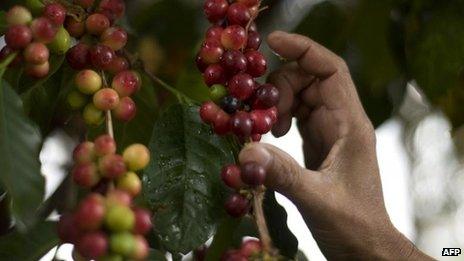Guatemala's coffee rust 'emergency' devastates crops
- Published

Coffee is Guatemala's most valuable export
Guatemala has declared a state of agricultural emergency after a coffee tree fungus blighted about 70% of the national crop.
Coffee rust causes trees to lose their leaves, resulting in fewer beans, of inferior quality.
Guatemala is releasing $13.7m (拢8.7m) in emergency aid to help small farmers buy pesticides to fight the fungus.
Honduras and Costa Rica have already declared national emergencies. El Salvador and Panama are also affected.
Coffee rust first became a significant problem in the 1860s in what was then called Ceylon (present-day Sri Lanka). More than 90% of crops were wiped out, and coffee-growing was abandoned on the island.
Coffee is Guatemala's main export, and coffee growers warn that hundreds of thousands of jobs could be lost.
"If we don't take the needed measures, in 2013-2014 our production could drop by 40%," Guatemalan President Otto Perez Molina said, according to the Associated Press.
The 大象传媒's Humphrey Hawkesley, in Guatemala, says the outbreak is blamed on climate change, with effects including a two-degree rise in temperature, higher rainfall and an increase in humidity.
John Vandermeer, an ecologist from the University of Michigan at Ann Arbor, that his research plot in Mexico had been devastated.
The majority of the trees had lost at least four-fifths of their leaves, while a third had no leaves at all, Mr Vandermeer said.
- Published30 January 2013